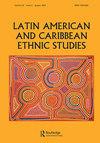Disrupting the silence: whiteness, power, and national imaginaries in Latin America
IF 1
Q4 ETHNIC STUDIES
引用次数: 0
Abstract
Taken together, the three books under review take great strides in extending many of the key insights from Whiteness Studies (a field that originated in Northern America) and from Latin American Studies. In particular, they challenge the widespread invisibility of whiteness in Latin America – both in everyday social relations and as an analytical category. While recognizing that whiteness is a complex and shifting category, these three authors interrupt the dominant silence that surrounds it and which is in itself one of the most powerful mechanisms whereby its naturalization and normalization preserve privilege. But rather than simply denounce silence as a strategy of power, the three books give substantive content to whiteness by grounding its meanings in each of the contexts they analyze in depth: the 19 th Century Colombian Andes; the neoliberal crisis in Argentina; and the contemporary moment in the Zona Norte of Rio de Janeiro, Brazil. Each of these works put the lived experiences and perspectives of white people under their analytical lens, thereby shaking their status as ordinary and bringing to the fore the historical and social construction of whiteness in all its intricacies. Their purpose is not to produce data about dominant subjects and their worlds per se , but rather, to contribute to our understanding of the mechanisms that produce and perpetuate racism. Because, as Ramos-Zayas reminds us, ‘the lives and mental worlds of people racialized as white provide important social maps to larger institutional, governmental, and capitalist relations’ (Ramos-Zayas 2020, 2). Mercedes打破沉默:拉丁美洲的白人、权力和国家想象
总的来说,这三本书在扩展白人研究(起源于北美的一个领域)和拉丁美洲研究的许多关键见解方面取得了长足的进步。特别是,他们挑战了拉丁美洲普遍存在的白人不可见性——无论是在日常社会关系中,还是作为一个分析范畴。虽然认识到白人是一个复杂且不断变化的类别,但这三位作者打破了围绕它的主导沉默,这本身就是其归化和正常化保持特权的最强大机制之一。但是,这三本书并没有简单地谴责沉默是一种权力策略,而是通过将其含义根植于他们深入分析的每一种语境中,为白人赋予了实质性的内容:19世纪哥伦比亚安第斯山脉;阿根廷的新自由主义危机;以及巴西里约热内卢北部地区的当代时刻。每一部作品都将白人的生活经历和视角置于其分析的镜头下,从而动摇了他们作为普通人的地位,并将白人的历史和社会建构置于其错综复杂的地位。他们的目的不是提供关于主导主体及其世界本身的数据,而是帮助我们理解产生和延续种族主义的机制。因为,正如拉莫斯-扎亚斯提醒我们的那样,“被种族化为白人的人们的生活和精神世界为更大的机构、政府和资本主义关系提供了重要的社会地图”(拉莫斯-扎亚斯2020年,2)
本文章由计算机程序翻译,如有差异,请以英文原文为准。
求助全文
约1分钟内获得全文
求助全文
来源期刊

Latin American and Caribbean Ethnic Studies
Social Sciences-Cultural Studies
CiteScore
1.30
自引率
16.70%
发文量
22
 求助内容:
求助内容: 应助结果提醒方式:
应助结果提醒方式:


